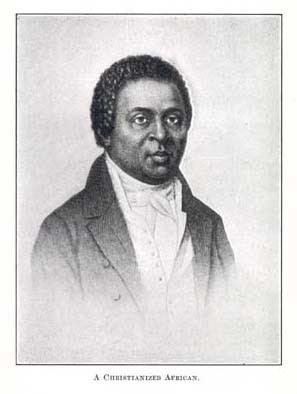Leadership Gallery
The Reverend Peter Williams, Jr., 1786-1840
Peter Williams, Jr., born in 1786, was the first African-American Episcopal Priest in New York. His father, Peter Williams Senior, was a member of the John Street Methodist Church and co-founded the African Methodist Episcopal Zion Church. Williams, Jr. was educated at the African Free School established in 1787 by the New York Manumission Society, a school from which several of New York's Black leaders sprang.
Frontispiece image entitled, ”A Christianized African” of the Reverend Peter Williams from The History of the Negro Church by Carter Godwin Woodson, published in 1921. Print courtesy of UNC and "Documenting the American South" project.
It is not known why or when Peter Williams, Jr. left the Methodism of his father to join the Episcopal Church. Reportedly, he was influenced by Thomas Lyell, a white Methodist who himself became an Episcopalian. In 1804 Lyell was ordained a priest and called as Rector of Christ Episcopal Church in New York, a position he held until his death in 1840.
New York Episcopal African Americans, desirous of becoming full participants in their chosen rite, formed the African Catechetical Institution which met in a room of the African Free School in 1809. That same year they approached the Diocese of New York asking that they be allowed to have one of their own ordained. The Diocesan Convention agreed to have a person of color appointed as lay reader and catechist but delayed granting their request for a priest. In 1813 Peter Williams, Jr. emerged as a spokesman for the African Catechetical Institution as he again petitioned the Convention to allow African Americans to form their own Church and to be ordained.
In 1819 a church was erected by the members of the African Catechetical Institution in the Five Points neighborhood of lower Manhattan. It was consecrated as St. Philip's Church on July 3 by Bishop John Henry Hobart who that same year admitted Williams as a candidate for the priesthood. Williams was ordained a deacon in 1820 and a priest in 1826. He was the second African American to be ordained a priest in The Episcopal Church following Absalom Jones whose ordination had occurred in the Diocese of Pennsylvania in 1804.
Williams was active in his community as a social leader as well as a spiritual one. He was a member of the American Anti-Slavery Society and co-founded the first African-American newspaper in the United States, Freedom's Journal. Despite his achievements as a priest, an orator, and an organizer, he bore the continued slights of racism. In 1834 Williams saw his church and home ransacked and demolished in the four night rampage of the Anti-abolition race riot. His daughter Amy Williams Cassey Remond took up the cause of abolitionism, her two marriages being to prominent anti-slavery activists: Joseph Cassey of Philadelphia and Charles Lenox Remond of Boston.
Peter Williams, Jr. died unexpectedly of pneumonia in 1840. His funeral was a major event attended by most of the white Episcopal clergy with the Bishop of New York officiating. As St. Philip's Vestry memorialized in a letter dated February 1843, St. Philip's “origen & duration, is indebted (under God's Providence) to the . . . holy zeal and self-sacrificing devotion of the Rev. Peter Williams.” The Church continues its ministry today at its present site at West 134th Street in Harlem. [Sources]


